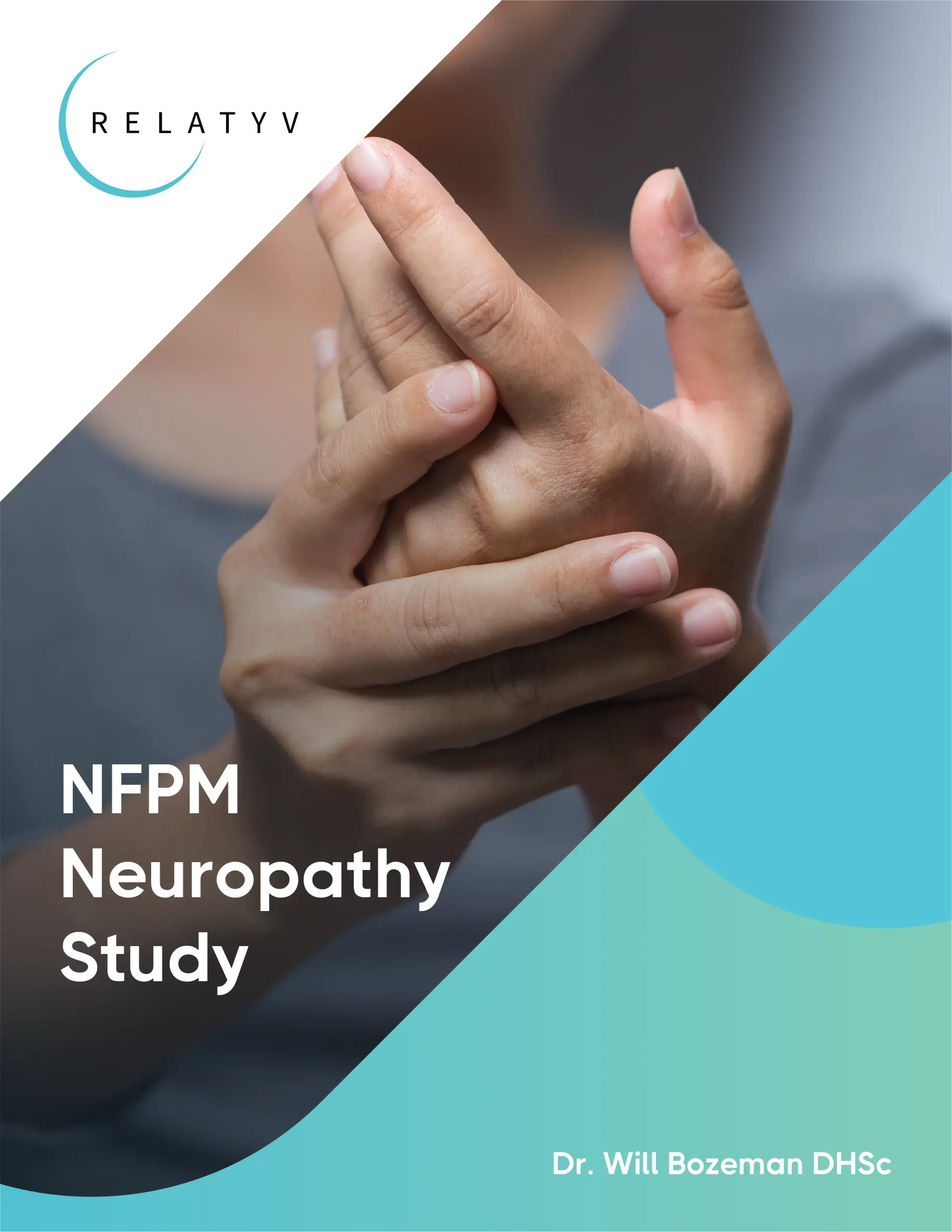Peripheral Neuropathy

What’s The Connection Between Peripheral Neuropathy And Fatigue?
Read More
September 28, 2023
Do you frequently feel exhausted? Besides merely being worn out from a long day, fatigue can be a symptom of more serious conditions, such as peripheral neuropathy and fatigue, a medical condition that affects your nervous system.
Within this article, we explore the complex relationship between fatigue and peripheral neuropathy and show how two seemingly unrelated conditions can impact your health and well-being.
We’ll begin with an explanation of the various medical aspects of fatigue and some of the common factors and conditions that influence it. Then, we’ll discuss peripheral neuropathy and its distinct types, defining how it affects the nervous system, its role in inducing symptoms of fatigue, and other distressing symptoms it can induce.
We’ll also provide information on helpful approaches to managing fatigue, including lifestyle modifications, professional interventions, and preventive measures.
At Relatyv, we understand how the effects of fatigue can significantly impact your quality of life. After reading this article, we hope you’ll have a better grasp of how peripheral neuropathy can cause fatigue, as well as new perspectives on this condition’s overall picture and how to manage its symptoms to enhance your quality of life.
Let’s begin by discussing what fatigue is, how it is perceived medically, and which conditions are frequently associated with this challenging symptom.
Imagine an overwhelming feeling of tiredness, a persistent lack of energy that makes you feel worn out and weary. This is how fatigue is commonly described, and it’s likely that you have experienced it or are currently confronting it. While fatigue is often linked with a stressful day or not getting enough sleep, its medical implications may not be so obvious.
The relationship between fatigue and a variety of medical conditions raises intriguing questions about how the underlying mechanisms of illness and disease can affect our overall sense of well-being. This is particularly the case with peripheral neuropathy and how nerve-related problems can cause feelings of immense exhaustion and malaise.
It is important to pay greater attention to symptoms of fatigue and acknowledge the many underlying medical issues that can cause this feeling of extreme exhaustion. Peripheral neuropathy is just one of a number of illnesses connected to exhaustion that warrant our attention:
Fibromyalgia is a severe illness that results in multiple symptoms, including widespread musculoskeletal pain, tiredness, and hypersensitivity. Numerous people who have fibromyalgia suffer from chronically low levels of energy that are not improved by rest.
Symptoms of fatigue and malaise seen in fibromyalgia are thought to be caused by a dysfunction of the natural system that helps us deal with stress and energy, called the hypothalamic-pituitary-adrenal axis.
Additionally, individuals with fibromyalgia can have decreased melatonin secretion at night, which is linked to poor sleep, excessive daytime fatigue, and altered pain perception.
Diabetes is a chronic health condition that causes fluctuations in blood sugar levels. Through a variety of mechanisms, both type 1 and type 2 diabetes can result in sensations of exhaustion and fatigue.
Blood sugar fluctuations can prevent cells from receiving adequate oxygen and nutrients, which will induce feelings of tiredness. Sleep deprivation can also be seen in diabetes, as high blood sugar levels cause headaches, thirst, and frequent urination at night.
In addition, the hardship of managing diabetes can have psychological effects, such as depression and anxiety, which can add to feelings of exhaustion.
Insomnia and sleep apnea are just two of the many conditions that can significantly lower a person’s overall level of energy, rendering them with feelings of persistent fatigue.
These disorders can prevent you from reaching deep and restorative stages of sleep or leave you feeling unrefreshed and drained during the day. Disruptions to the natural sleep cycle prevent your body from maintaining adequate repair and rejuvenation, resulting in a constant sense of tiredness.
Anemia is a medical condition that causes a deficiency of red blood cells throughout the bloodstream. This may be caused by an underlying issue such as low iron levels, immune disorders, or certain medications.
Red blood cells are essential for carrying oxygen to all of the body’s tissues and organs. When their numbers decrease, it leads to insufficient oxygen delivery, impacting overall bodily function. This deficiency in oxygen can result in feelings of exhaustion and fatigue as the body struggles to meet its energy demands.
Peripheral neuropathy is characterized by damage or dysfunction of peripheral nerves, which are the nerves that are not connected to the brain or spinal cord. It is known to have various causes, including diabetes (both type 1 and type 2), vitamin deficiencies, autoimmune diseases, and certain medications.
As our primary focus, we will discuss how peripheral neuropathy leads to fatigue in greater detail in the sections that follow.
When we have a deeper understanding of these factors, we can begin to comprehend how fatigue can go beyond just a lack of sleep and instead be linked to a number of medical issues.
In the upcoming sections, we will take a closer look at the connection between peripheral neuropathy and fatigue, clarifying how its effect on the nervous system may contribute to this widespread feeling.
While peripheral neuropathy may be an unfamiliar term, its implications can be profound. The peripheral nerves of the body become damaged by this complicated disorder, which disrupts the flow of information between the brain, spinal cord, and body.
Peripheral neuropathy often leads to damaged nerves in the hands, arms, feet, and legs, where it goes on to cause sensations of numbness, muscle weakness, balance problems, impaired reflexes, poor coordination, and even organ dysfunction in severe cases.
Over time, fatigue can develop as a result of peripheral neuropathy’s interference with regular bodily functions. The cycle of discomforts brought on by nerve injury can affect a person’s emotional well-being, in addition to causing physical pain.
This ongoing impact can cause individuals to feel worn out, leading them to seek additional rest. Moreover, neuropathy’s pain disrupts sleep, leading to poor sleep quality and daytime fatigue.
Additionally, neuropathy impairs muscle strength and limits physical activity, which decreases cardiovascular flow and exacerbates mood depression, all of which add to fatigue.
Finding effective relief from the discomfort and emotional toll that peripheral neuropathy causes can be a lifelong struggle that can create mental exhaustion and difficulty focusing.
Feelings of fatigue are linked to all of these challenges that peripheral neuropathy brings, highlighting the intricate relationship between the two. Let’s continue to look deeper into peripheral neuropathy’s complexities by examining its two distinct types, as well as several additional symptoms it can cause alongside fatigue.
There are two main types of peripheral neuropathy, and because of how they affect the nervous system, each type has slightly distinct symptoms, including different symptoms of fatigue. The two main types of peripheral neuropathy are:
This type of peripheral neuropathy occurs when the nerve’s protective layer, called the myelin sheath, suffers from damage. Swelling and inflammation lead to degeneration of this protective layer, which disrupts the nerve’s ability to transmit nerve impulses, causing sensations of numbness and tingling.
Chronic levels of inflammation seen in this type of neuropathy can lead to a global overstimulation of the body’s cells, requiring increased energy output, which eventually leads to fatigue. Additionally, the discomfort and altered nerve functionality could potentially contribute to an individual’s overall sense of tiredness.
This form of peripheral neuropathy causes trauma to the axon, a crucial part of a nerve cell, which can lead to diminished nerve function, affecting both movement and sensation.
Axonal degeneration and fatigue are related in that when a nerve is damaged, it affects an individual’s ability to move, feel, and perform everyday tasks. This can cause muscle deterioration, resulting in weaknesses that make people feel drained and worn out physically as well as mentally.
Recognizing the complex links between nerve damage and fatigue is essential to understanding the overall effects of peripheral neuropathy on one’s well-being, even if the links can vary.
Besides fatigue, peripheral neuropathy can bring about a series of accompanying symptoms. Identifying the additional discomforts that this complex condition can bring will lead to a more accurate diagnosis and proper management. Here’s a brief overview of some of these interconnected symptoms:
With a deeper understanding of these additional signs of peripheral neuropathy, you can discover suitable interventions to effectively manage your individual symptoms.
Let’s move our attention to some practical strategies you can use to combat the relentless effects of fatigue and try to recapture your energy levels.
Managing fatigue and chronic exhaustion is an individual journey, where strategies that work for some sufferers may not work for others. While there might not be a one-size-fits-all solution, there are some practices you can incorporate into your daily routine that can significantly improve your energy levels and overall well-being:
It’s crucial to keep in mind that fighting fatigue starts with a solid comprehension of the condition and consistent application of fundamental management techniques such as those listed above. Integrating these practices into your daily life can pave the way for more energy and an improved sense of well-being, even in the presence of peripheral neuropathy.
Remember, it may take some time to find what works for you. However, regular communication with your healthcare provider can provide you with the confidence and support you need to adapt these strategies to your specific needs. Next, we will discuss some additional approaches that can be beneficial through the comprehensive guidance of doctors and alternative healthcare specialists.
Seeking advice from medical experts can make a big difference when it comes to managing the various challenges that come with peripheral neuropathy. Even though this condition does not currently have a cure, there are a number of methods that may be implemented to alleviate many of its unpleasant symptoms, including fatigue.
Our article on the Relatyv protocol for neuropathy explains how Neurofunctional Pain Management can provide enduring relief from peripheral neuropathy symptoms. Two additional approaches that healthcare professionals may recommend are:
Healthcare providers can prescribe a number of pharmaceuticals that are aimed at addressing specific symptoms of peripheral neuropathy. The types of medications utilized will vary, focusing on the different aspects of peripheral neuropathy, such as nerve pain, inflammation, or slowing the progression of underlying health issues.
The intention is to address these individual factors in order to reduce discomfort as well as the effects of fatigue.
Behavioral therapy, sometimes called cognitive behavioral therapy (CBT), is a psychological therapeutic approach that can help combat disease and illnesses. It involves employing cognitive and behavioral interventions to create shifts in lifestyle and altering mindsets.
This therapeutic approach focuses on enhancing individuals’ resilience by equipping them with valuable coping mechanisms and strategies to manage emotional distress, anxiety, and stress – factors that can exacerbate fatigue.
Consulting with healthcare professionals ensures you receive a comprehensive and tailored approach that proactively addresses fatigue and its underlying causes, leading you toward a better quality of life despite the challenges of peripheral neuropathy.
Prevention is the key to reducing the effects of peripheral neuropathy and fatigue. While the exact onset of peripheral neuropathy may not always be preventable, there are some measures you can take to minimize the potentially debilitating effects of fatigue taking hold. These include:
Individuals can drastically alter the course of peripheral neuropathy by proactively adopting these methods. With a comprehensive understanding and support from your healthcare providers, you can help reduce the risk and lessen the effects peripheral neuropathy and fatigue have on your life.
The intricate link between peripheral neuropathy and the persistent feeling of exhaustion shows how varied this condition can be. Although this link may initially seem intimidating, it’s important to realize that there are workable strategies to reduce its impact on your overall health and well-being.
Individuals can successfully navigate the difficulties caused by peripheral neuropathy and the fatigue it causes by adopting a complete strategy that includes lifestyle modifications, professional guidance, and preventative measures.
By gaining a comprehensive understanding of available treatments and management strategies, you can make well-informed decisions about your healthcare that are tailored to your unique needs and lifestyle.
Relatyv offers specific therapies and support that can enhance your journey. Our innovative therapies are designed to target the root causes of peripheral neuropathy, addressing both its painful symptoms and the fatigue that often accompanies it.
With our team of experts, we can assist you on your path toward improved well-being, helping you regain a sense of vitality and an active life, even in the face of challenges. Your journey to relief and a magnified quality of life can begin with Relatyv.
About the Author
Will is a healthcare executive, innovator, entrepreneur, inventor, and writer with a wide range of experience in the medical field. Will has multiple degrees in a wide range of subjects that give depth to his capability as an entrepreneur and capacity to operate as an innovative healthcare executive.
Share on Social Media




You can see how this popup was set up in our step-by-step guide: https://wppopupmaker.com/guides/auto-opening-announcement-popups/
You can see how this popup was set up in our step-by-step guide: https://wppopupmaker.com/guides/auto-opening-announcement-popups/
Neurofunctional Pain Management Overview
Symptoms
Conditions Treated
Treatments
Articles by Category
Locations
Colorado
Wisconsin
Georgia
Hiram
Lawrenceville
Marietta
Powder Springs
Texas
Waco
Victoria
Illinois
Buffalo Grove
New Lenox
St. Charles
Arizona
Tucson
Waddell
Arlington
Avondale
Buckeye
Superior
Mesa
Palo Verde
Morristown
Tempe
Chandler
Anthem
Eloy
Florence
Fort McDowell
Phoenix
El Mirage
Coolidge
Gilbert
Arizona City
Casa Grande
Casa Blanca
Aguila
Sacaton
Apache Junction
Kearny
Stanfield
Goodyear
Litchfield Park
Alabama
Arkansas
California
Florida
Idaho
Indiana
Iowa
Kansas
Louisiana
Maryland
Michigan
Rhode Island
Minnesota
Mississippi
Nevada
New Jersey
New Mexico
North Carolina
Ohio
Pennsylvania
South Dakota
Tennessee
Utah
Virginia
Washington

